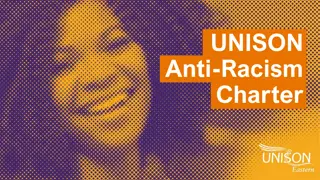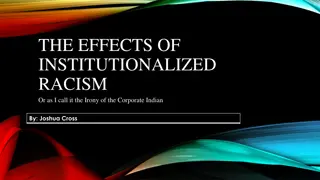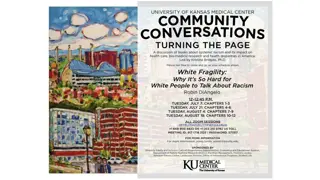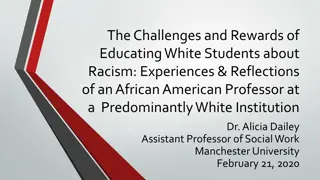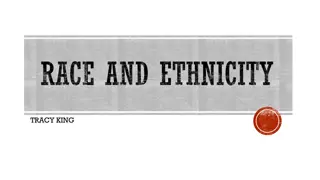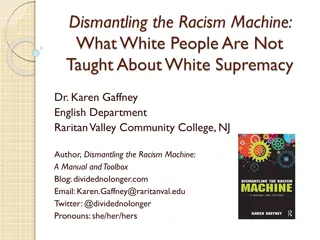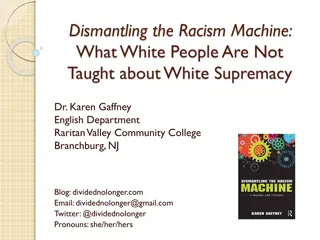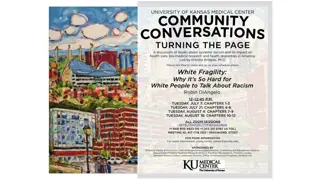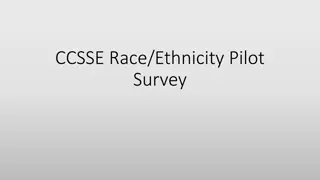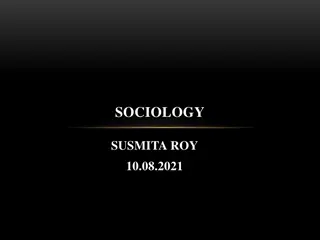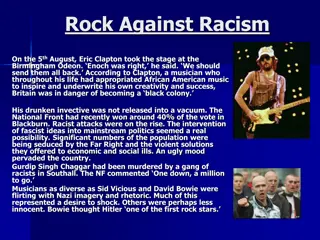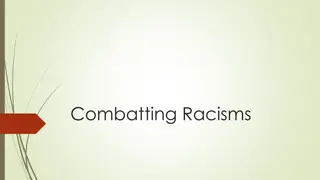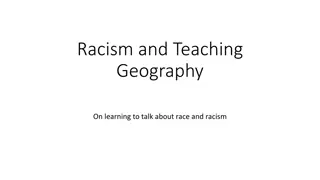Engaging Pedagogically with Race and Racism in Higher Education
This keynote lecture by Dr. Jason Arday from University College London (UCL) delves into the importance of decolonising the curriculum, addressing racism within educational settings, and promoting inclusive pedagogies. It highlights the impact of systemic biases on educational practices and underscores the need for a more diverse and representative curriculum to foster inclusivity and equity in higher education.
Download Presentation

Please find below an Image/Link to download the presentation.
The content on the website is provided AS IS for your information and personal use only. It may not be sold, licensed, or shared on other websites without obtaining consent from the author. Download presentation by click this link. If you encounter any issues during the download, it is possible that the publisher has removed the file from their server.
E N D
Presentation Transcript
Learning to Fly: Engaging pedagogically with race and racism in Higher Education Dr Jason Arday University College London (UCL) Keynote Lecture Monday 16thMarch 2020 1
A Thought An inclusive curriculum aims to improve the experience, skills and attainment of all students, including those in protected characteristic groups, by ensuring that all students, regardless of background, are able to participate fully and achieve at equal rates (UCL Inclusive Curriculum Health Check, UCL BAME Awarding Gap Project, 2018).
Areas for Consideration This keynote will consider the following themes interchangeably: Decolonising the curriculum Intersectionality Considering inclusive pedagogies Acknowledging existing good practice at UCL Considering unconscious bias Centring discussions about race and racism within curricula
Decolonising the Curriculum Anti-racist education holds the potential to truly reflect the cultural hybridity of our diverse, multi-cultural society through the canons of knowledge that educators celebrate, proffer and embody (Peters, 2015). The centrality of Whiteness as an instrument of power and privilege ensures that particular types of knowledge continue to remain omitted from our curriculums (Arday, 2020). The monopoly and proliferation of dominant White European canons does comprise much of our existing curriculum and consequently this does impact on aspects of engagement, inclusivity and belonging particularly for Black and minority ethnic (BAME) learners (Arday 2020).
Decolonising the Curriculum The dearth of Black, Asian and Minority Ethnic (BAME) gatekeepers to knowledge in the Academy has been a contributing factor in sustaining systemic racism and stereotypes against ethnic minority groups While traction regarding this issue continues to gather momentum nationally within the UK and globally, the curriculum and pedagogies that pervade within our institutions continue to remain a site for the systemic reproduction of racism The absence of a multi-cultural curriculum that is reflective of an ever-increasing, multi-cultural society continues to contradict and compromise the lofty egalitarian ideals often espoused by universities. Consequently, such omissions are complicit in sustaining misinterpretations of Black and minority ethnic individuals. (Arday, 2020).
Practical Interventions Curriculum design Reading lists Black and Ethnic Minority student engagement Library engagement
Intersectionality The concept of intersectionality has taken centre stage, particularly within the Academy and become a dominant model with which to engage in how differences such as race , gender, class, sexuality, age, disability and religion interweave and intersect upon individual lives in a modern risk society (Beck 1992). Otherness is related to the notion that identity itself is fragmented, fragile even, yet constantly evolving through multiple engagements and relationships in society and through this complexity, intersectionality helps us to engage with understanding outsiders and what it means to be a stranger in modern society (Bauman 1990).
Intersectionality: Understanding this context in the Academy Accepting difference in the university communities Tolerance Inclusivity Seeing yourself reflected in the university community (Arday, 2020).
A Thought Our Education Strategy (2016-21) commits us to developing personalised student support, ensuring that UCL is a place where all our students thrive The BME Attainment project is one strand of a broader piece of work that we are undertaking in partnership with the Students' Union UCL to make our university truly inclusive (Professor Anthony Smith, Vice Provost for Education and Student Affairs). 9
Considering Inclusive Pedagogies Valuing all bodies and canons of knowledge Diversifying the gatekeepers to knowledge Engaging with BAME students to incorporate their histories Understanding the systems of marginalisation and exclusion in the learning environment Apartheid of Knowledge (Arday and Mirza, 2018; Andrews, 2016).
Considering Unconscious bias Unconscious bias has emerged within the equality, diversity and inclusion environment in UK Higher Education Institutions (HEIs) as an explanation for statistical racial disparities. Unconscious bias is the acceptable face of racism, the phrase that a majority white sector feels comfortable with using and discussing to describe itself. Unconscious bias training demonstrates universities good faith and willingness to address racism and offers a re-take should participants fail the first time. No-one is left behind or outside the unconscious bias community because it is regarded as the principal vehicle for institutional culture change. (Tate and Page, 2018).
Considering Unconscious bias Unconscious bias happens by our brains making incredibly quick judgements and assessments of people and situations without us realising. Our biases are influenced by our background, cultural environment and personal experiences. We may not even be aware of these views and opinions, or be aware of their full impact and implications. AdvanceHE has also developed training materials to help us to uncover unconscious bias and act to counter it. However, if they are deeply ingrained into our thinking and emotions they must be resistant to change. Notwithstanding this, unconscious bias has initiated a resurgence in equality, inclusion and diversity training within a background of continuing racism, sexism, homophobia, ableism, transphobia, class discrimination and rampant cis-gender politics within UK universities. (Tate and Page, 2018).
Centring discussions about race and racism within the curricula There has been a reluctance to engage with these issues concerning race and racism and generally within society Creating spaces for all members of the university community to have conversations about race and racism, particularly within the learning environment Ensuring that there is an openness from particularly staff (eliminating hierarchy) and students towards learning (reciprocity)
Optimising Change Understanding the importance of diversifying academic teaching staff to ensure better representation Listening to BME student voice and engaging them collaborative endeavour regarding the curriculum design process to ensure a more inclusive curricula Understanding the importance attributed to inherent unconscious biases and how this can unintentionally effect our perceptions of BME students and staff Recognising some of the cultural expectations and burdens that are placed on BME students and staff, in particular female BME students and staff The onus is on all custodians of the Academy to take collective responsibility in dismantling racism within HE 14
Acknowledging good practice at UCL Inclusive Curriculum Check (UCL BAME Awarding Gap Project, 2018): UCL have undertaken a three-year project to address the disparities in attainment and experience of UK undergraduate BAME and white students at UCL UCL has undertaken an analysis of data which shows a small but statistically significant discrepancy in the rate of good degree achieved, despite entering UCL with the same high entry qualifications The institutional acknowledgement underpinned by research shows that developing a curriculum that is more inclusive is successful in reducing the attainment gap by allowing all students to relate to and engage more with academic material and assessments
Concluding Thought I am he as you are (s)he as you are me and we are all together (I am the Walrus, The Beatles, 1967). 16



